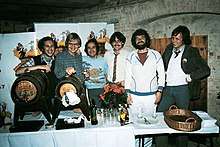Shu-bi-dua
Shu•bi•dua or Shu-bi-dua is a Danish pop group that was formed in 1973 in Copenhagen, as an expansion of the group Passport. Throughout their 40-year history, Shu-bi-dua changed their lineup many times, however their lead singer Michael Bundesen was with the band throughout, except for the gap between 1984 and 1987. They have produced many well-known hits in Denmark, like Vuffeli-vov, Hvalen Hvalborg, Står på en Alpetop, Stærk Tobak (to the music from the Phil Medley and Bert Russell song Twist and Shout), Familien kom til Kaffe, Sex Chikane, We wanna be free, and many more. Their musical style owed much to folk and Central European schlager. They are the Danish band with most selling albums in Denmark.
Shu-bi-dua | |
|---|---|
 The band, 1980. | |
| Background information | |
| Origin | Copenhagen, Denmark |
| Genres | Rock, Pop |
| Years active | 1973–2011 |
| Website | shubidua |
History
Passport, which in the beginning of 1973 released the single Tomorrow/Everything's Wrong, consisted of the guitarists Michael Hardinger and Poul Meyendorff, the drummer Bosse Hall Christensen, and bass guitarist Niels Grønbech. The group was extended with the singer Michael Bundesen and keyboard player Jens Tage Nielsen, and under the name Shu-bi-dua released the single Fed Rock/Tynd Blues, before the group again as Passport released the single Change of the Guard/Highway of Living. Shu-bi-dua was originally thought of as a one-off group, but when the debut single produced the hit Fed Rock, they chose to keep it.
As Shu-bi-dua they quickly gained success, and the name Passport was dropped. In 1974 they released their first self-titled album Shu-bi-dua. After the first album, Poul Meyendorf left the group and was replaced by Claus Asmussen, who was a sound engineer on the first.
Since then the group has had numerous changes in its lineup. Claus Asmussen replaced Poul Meyendorff in 1975, Kim Daugaard replaced Niels Grønbech in 1977, Willy Pedersen replaced Jens Tage Nielsen, and Kasper Winding replaced Bosse Hall Christensen in 1981. In 1984 Michael Bundesen left the group to become station chief on the Copenhagen TV station Kanal 2, and simultaneously Kasper Winding left to be replaced by Paul Callaby. In 1987 Jørgen Thorup was made a permanent member in the group when Willy Pedersen left. Thorup had been singing backup vocals since Shu-bi-dua 11 in 1985. In 1987 Michael Bundesen returned as lead singer, while Søren Jacobsen also joined the band. In 1988 Peter Andersen replaced Paul Callaby as drummer, and shortly thereafter Søren Jacobsen left the band again. After having made the film Den røde tråd in 1989, they went on a sabbatical until their return in 1992 with the hit single Sexchikane. In the intervening years their back catalog was rereleased on CD in 1990, and in 1991 a Best Of album by the name Stærk Tobak was released. In connection to this they played live in front of 50,000 people on Bellevue Beach. In 1997 Michael Hardinger left the band after 24 years. He was replaced by Ole Kibsgaard, and in 2001 Jørgen Thorup left the band to be replaced by Jacob Christoffersen. In 2003 their 30th anniversary was celebrated with a 10-CD set called Shu-bi-dua 200 (each CD had 20 songs). In 2005 Claus Asmussen left Shu-bi-dua having been the only original continuous member in the group's 30-year history. The group has, since 2011, been on an indefinite hiatus, since lead singer Michael Bundesen suffered a brain embolism, from which he is still recovering.
Lineup
- Last line-up (2011)
- Michael Bundesen (vocals), 1973–1984, 1987–
- Kim Daugaard (bass/vocals), 1977–
- Peter Andersen (trommer/vocals), 1988–
- Ole Kibsgaard (guitar/vocals), 1997–
- Jacob Christoffersen (keyboard/vocals), 2001–
- Previous members
- Michael Hardinger (guitar/vocals), 1973–1997 (+ lyrics/composer and guest musician in 2005)
- Poul Meyendorff (guitar), 1973–1974
- Niels Grønbech (bass), 1973–1977
- Bosse Hall Christensen (Drummer), 1973–1981 (+ lyrics 1985)
- Jens Tage Nielsen (keyboard), 1973–1981
- Claus Asmussen (guitar/vocals), 1975–2005
- Kasper Winding (Drummer), 1981–1984
- Willy Pedersen (keyboard), 1981–1986
- Paul Callaby (Drummer), 1984–1988
- Jørgen Thorup (keyboard/vocals), 1987–2001
- Søren Jacobsen (keyboard/guitar), 1987–1988
Discography
Studio albums
- 1974: Shu-bi-dua
- 1975: Shu-bi-dua 2
- 1976: Shu-bi-dua 3
- 1977: Shu-bi-dua 4
- 1978: 78'eren
- 1979: Shu-bi-dua 6
- 1980: Shu-bi-dua 7
- 1982: Shu-bi-dua 8
- 1982: Shu-bi-dua 9
- 1983: Shu-bi-dua 10
- 1985: Shu-bi-dua 11
- 1987: Shu-bi-dua 12
- 1992: Shu-bi-dua 13
- 1993: Shu-bi-dua 14
- 1994: Shu-bi-40
- 1995: Shu-bi-dua 15
- 1997: Shu-bi-dua 16
- 2000: Shu-bi-dua 17
- 2005: Shu-bi-dua 18 (Peaked in DEN: #2)[1]
Compilations and live releases
- 1975: Shu-bi-dua's værste
- 1978: Leif i Parken
- 1981: Duernes bedste
- 1985: Da mor var dreng
- 1988: 32 Hits
- 1991: Stærk tobak!! (3-CD set)
- 1992: Vi finner oss ikke i sexsjikane (Norwegian)
- 1994: Live og glade dage
- 1996: 15 skarpe skud, 1996
- 1997: 40 bedste
- 1998: Shu-bi-læum 73–98
- 2001: Rap jul og godt nytår
- 2003: Shu-bi-dua 200 (Peaked in DEN: #1)[1]
- 2004: Symfo-ni-dua
- 2010: Shu-bi-dua 1–18 (Box) (Peaked in DEN #40)
- Shu-bi-dua 1–9 (Box) (Peaked in DEN #2)
- Shu-bi-dua 10–18 (Box) (Peaked in DEN #27)
- 2010: Live i Stockholm (download only)
- 2013: 40 Års Shu-bi-læum – De 40 Største hits (Peaked in DEN #2)(Certified gold)
Singles
- 2010: "Midsommersangen" (Peaked in DEN: #32)[1]